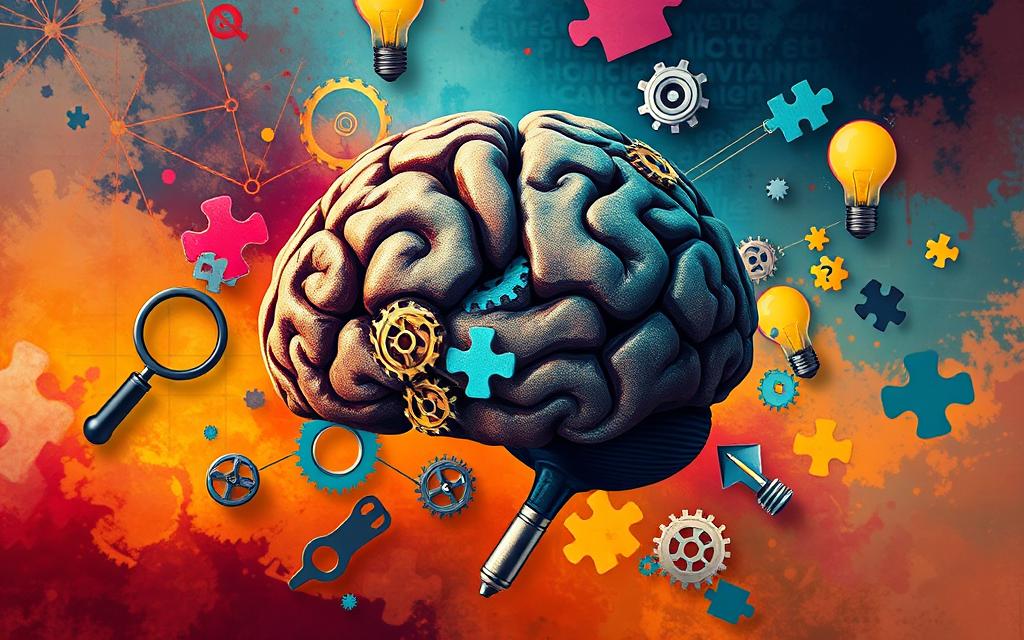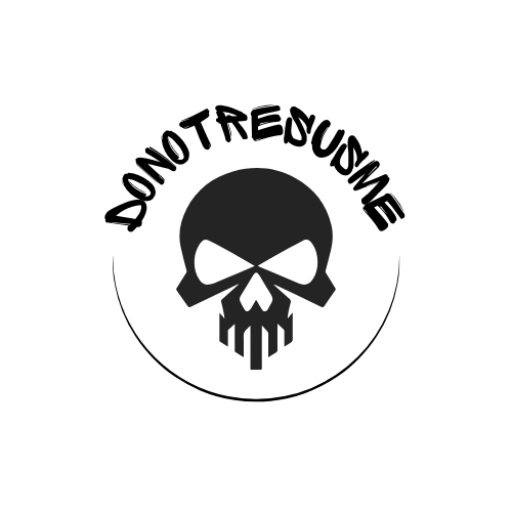Did you know the average person makes about 35,000 decisions every day? In today’s world, being able to think critically is more important than ever. I’m here to show you how improving your critical thinking can change your life.
Critical thinking is like having a superpower. It lets us analyze information, question what we assume, and make smart choices. With this skill, we can handle life’s complexities clearly and confidently, always looking for the truth.
Picture a life where you can easily tell what’s real from what’s not, spot logical mistakes, and solve problems creatively. That’s what critical thinking can do for you. It’s the secret to reaching your full potential and taking control of your future.
Embrace Curiosity: The Spark of Critical Thinking
Curiosity drives critical thinking. It makes us want to explore, question, and seek deeper understanding. This mindset helps us see things from new angles and question what we thought was true. It’s the key to reaching our full potential and learning more.
By being curious, we start a journey of discovery. We question what’s normal, explore the unknown, and find new insights. This curiosity helps us learn better, think more critically, and make smart choices.
Questioning Conventional Wisdom
Critical thinkers don’t just accept what they’re told. They love to explore new perspectives and challenge conventional wisdom. Questioning our assumptions opens us up to new ideas and different ways of seeing things.
“The important thing is not to stop questioning. Curiosity has its own reason for existing.” – Albert Einstein
When we seek deeper understanding, we keep learning for life. We dive deep into topics, looking for their hidden details. This desire for knowledge boosts our critical thinking and leads to new discoveries.
Starting with curiosity is key to critical thinking. It’s about exploring, questioning, and seeking more knowledge. This approach leads to a richer and more rewarding intellectual journey.
Question Everything: The Hallmark of Critical Thinkers
In today’s world, critical thinkers are great at questioning assumptions, seeking evidence, and examining different viewpoints before they make up their minds. This way, they can see things clearly and make smart choices.
Being curious is key to critical thinking. These thinkers don’t just take things as they are. They look deeper, see things from other angles, and question the basics. By questioning everything, they find hidden biases and logical mistakes. This helps them understand things better.
- Questioning assumptions: Critically examining the basic beliefs or premises that underlie a claim or argument.
- Seeking evidence: Actively gathering reliable and relevant data to support or refute a position.
- Examining different viewpoints: Considering multiple perspectives, including those that challenge one’s own beliefs and preconceptions.
This way, we can make better and more informed choices. Instead of just going by what we first hear or think, critical thinkers look deeper. They use a discerning eye to tackle complex issues and come to solid conclusions based on evidence.
“The essence of the independent mind lies not in what it thinks, but in how it thinks.” – Christopher Hitchens
By always questioning assumptions, seeking evidence, and examining different viewpoints, we can grow our critical thinking skills. This helps us understand more and make well-informed decisions in our daily lives.
Analyze and Evaluate: Dissecting Information
As critical thinkers, we must learn to break down information into its main parts. This lets us check if it’s true and reliable. By improving our analytical skills, we can tell facts from opinions and spot logical mistakes. This helps us make smart choices.
Evaluating Validity and Reliability
First, we need to check if the information is valid and reliable. We look at the source’s trustworthiness, how the data was gathered, and if it makes sense. This way, we can tell what’s real from what’s not.
Distinguishing Fact from Opinion
Being able to tell facts from opinions is key to critical thinking. We need to look deeper than what’s on the surface. By doing this, we can avoid being fooled by biased or weak arguments. Instead, we can make our own smart conclusions.
Identifying Logical Fallacies
Critical thinkers are good at finding logical mistakes in arguments. Knowing about common mistakes like personal attacks or wrong comparisons helps us see if an argument is strong. This keeps us from being fooled by bad logic.
Learning to analyze and evaluate information helps us make better choices. It makes us clearer and more confident in our views.
| Evaluation Criteria | Considerations |
|---|---|
| Source Credibility |
|
| Data Reliability |
|
| Logical Coherence |
|
“The essence of the independent mind lies not in what it thinks, but in how it thinks.”
– Christopher Hitchens
Embrace Creative Problem-Solving
We don’t settle for just any solutions. We use our creativity to come up with new ideas and solve problems in unique ways. By thinking outside the box, we can beat obstacles and grab chances that others miss.
Being open to creative problem-solving means we’re ready to question the usual ways and look at things from new angles. It’s about stepping back, seeing the problem differently, and finding fresh solutions. This way, we can find innovative solutions that others might not see.
- Keep an open mind and don’t rush to conclusions. Don’t accept the first idea that pops up.
- Join brainstorming sessions and welcome all kinds of ideas, no matter how unusual they are.
- Try out different ways to solve problems, like mind mapping or design thinking.
- Look for inspiration in places like nature, art, or fields that aren’t directly related to your problem.
- Be brave and take risks. Thinking outside the box means being open to new experiences.
“Creativity is intelligence having fun.” – Albert Einstein
By using a creative approach to solve problems, we can see things in new ways and find solutions others haven’t thought of. This is a key skill for critical thinkers. It helps us deal with the fast-changing world better and succeed more often.
Continuous Learning: A Lifelong Journey
In today’s fast-changing world, critical thinking is more than a goal; it’s a journey. It needs an open mind, a desire for knowledge, and a readiness to challenge our own beliefs. By adopting a growth mindset, we can stay flexible and quick to adapt. This helps us lead and overcome complex challenges smoothly.
Being curious and eager to learn defines a critical thinker. We must always look for new info, consider various views, and doubt our first thoughts. This lifelong learning approach lets us adjust to new situations and solve new problems creatively.
Having a growth mindset means we see our skills and knowledge as things we can improve. We must be ready to take risks, learn from errors, and expand our knowledge. This mindset of adaptability and agility is key in a world that’s always changing.
“The secret of change is to focus all of your energy, not on fighting the old, but on building the new.” – Socrates
By always questioning our beliefs and looking for new learning chances, we reach our full potential as critical thinkers. This lifelong journey of growth and self-discovery helps us handle the modern world’s complexities with ease and confidence.
how to develop critical thinking skills

Developing strong critical thinking skills helps us deal with the complexities of our world. By using proven techniques and strategies, and doing exercises regularly, we can learn to analyze information and make smart decisions. This leads to success in both our personal and professional lives.
Embrace Curiosity and Questioning
Critical thinking starts with being curious and always questioning. By questioning what we know and looking at things from different angles, we open up new ways of thinking. This helps us make smart choices and find new solutions.
Sharpen Your Analytical Abilities
Good critical thinkers can break down information and spot logical mistakes. They know how to tell facts from opinions. By analyzing things carefully, we learn to judge the trustworthiness of information. This is key to making good decisions.
Engage in Regular Exercises
- Practice active listening and questioning to get all the facts.
- Do problem-solving exercises that make you think from different angles.
- Look at news articles or research papers to spot biases and errors.
- Join group discussions to share different views and have constructive debates.
Improving critical thinking is a journey of continuous learning. By being open to learning and spending time on these skills, we can reach our full potential. This helps us succeed in a world that’s always changing.
“The capacity to learn is a gift; the ability to learn is a skill; the willingness to learn is a choice.” – Brian Herbert
Cultivate Open-Mindedness
As we move through life, learning to think critically is key. Open-mindedness means being open to new ideas and not judging too quickly. It’s about being ready to listen and learn from others. This mindset helps us grow, question our beliefs, and make better choices.
Being open-minded means we can look at different views without bias. Instead of dismissing new ideas, we should be curious and want to learn. This way, we get a deeper understanding of things and see the full picture.
Another part of being open-minded is not jumping to conclusions. We often make quick decisions based on what we already think we know. But, by waiting to make judgments, we can make sure our choices are based on solid facts.
Lastly, being open to feedback shows we’re open-minded. We should value constructive criticism because it helps us grow. By listening to others, we keep improving our critical thinking and keep learning throughout our lives.
“The fastest way to expand your life is to expand your perspective.” – Unknown
Developing an open-mindset is a great way to become a better critical thinker. By being curious, not judging too quickly, and listening to others, you’ll make better choices and see the world more clearly.
Sharpen Your Problem-Solving Abilities
As critical thinkers, we know that solving problems is key to our success. It lets us face complex challenges, understand problems deeply, and find new solutions. We’ll look at how to improve our problem-solving skills in this section.
Define the Problem
The first step is to define the problem clearly. We gather information, find the root causes, and pinpoint what needs fixing. This focused approach helps us aim our efforts better, leading to better solutions.
Gather Relevant Information
After defining the problem, we gather all needed info. This might mean researching, talking to experts, or analyzing data. Understanding the problem well helps us spot obstacles, see patterns, and find insights for our decisions.
Brainstorm Potential Solutions
With a good understanding of the problem, it’s time to brainstorm solutions. We use our knowledge, intuition, and skills to think of many ideas. We aim for a wide range of options, without worrying about what’s possible.
Evaluate Alternatives
Now, we look at each potential solution closely. We weigh the good and bad, think about how possible each option is, and look for risks. This helps us choose the best action.
Implement the Solution
Next, we put our chosen solution into action. This might mean making a plan, using resources, and checking on progress. We stay alert, ready to adjust as needed, to solve the problem well.
By following these steps, we can handle complex challenges with confidence and creativity. Let’s improve our problem-solving skills and use our critical thinking fully.
Develop Reasoned Judgment

As critical thinkers, making reasoned judgments is key. This means looking at evidence objectively, thinking about different views, and making smart choices. By improving our objective analysis and evaluating evidence, we can handle tough situations with ease and clear thinking.
Learning to make reasoned judgments helps us live our lives on our terms. It helps us avoid quick decisions and choose wisely. This way, we can question assumptions, think deeply, and make choices that match our values and goals.
- Gather and assess information objectively
- Consider diverse perspectives before forming opinions
- Weigh the pros and cons of potential solutions
- Make decisions based on sound reasoning and evidence
- Remain open to re-evaluating decisions as new information emerges
Getting better at reasoned judgment changes how we live and shape our stories. It lets us face challenges with confidence, make smart choices, and live a life that’s truly ours.
“The ability to make reasoned judgments is the foundation of critical thinking and personal empowerment.”
Embrace Reflective Thinking
I’ve learned the power of reflective thinking. It helps me look closely at my thoughts, actions, and results. This has been key to my growth and learning.
By thinking deeply about my beliefs and the views of others, I understand more. I can use this knowledge to make better choices and act wisely.
Reflective thinking is vital for growth and being adaptable. It lets me question my own ideas and see things from different angles. This has helped me succeed in a changing world.
Through this practice, I’ve become more thoughtful and careful in my approach. I don’t just accept things without question. I dig deeper, looking for the truth behind the facts. This has made me better at making smart decisions.
Reflective thinking has changed me for the better. It has improved how I solve problems and understand myself better. By examining my thoughts and actions, I’ve discovered my strengths and weaknesses. This knowledge helps me keep getting better.
“Reflective thinking is the key to unlocking our full potential. It is the bridge that connects our past experiences to our future growth and success.”
I plan to keep practicing reflective thinking as I grow personally and professionally. It helps me do better in my relationships, work, and community. Being able to adapt and improve is what makes a critical thinker.
| Benefit | Description |
|---|---|
| Deeper Understanding | Reflective thinking allows you to gain a more nuanced and comprehensive understanding of a situation, by examining it from multiple angles and perspectives. |
| Continuous Improvement | By regularly reflecting on your actions and thought processes, you can identify areas for growth and implement changes to enhance your future performance. |
| Adaptability | Reflective thinking enables you to remain agile and responsive to changes, as you continuously update your knowledge and adjust your approach accordingly. |
| Emotional Intelligence | Engaging in reflective thinking can deepen your self-awareness and empathy, allowing you to better understand your own emotions and those of others. |
Hone Your Communication Skills
Effective communication is key to critical thinking. As a critical thinker, you must be able to articulate ideas clearly and persuasively. This means expressing complex concepts well and being good at active listening and adapting communication styles for different people.
To get better at communicating, start by improving your active listening skills. Really get what your audience is saying and shape your message to fit them. Use clear and concise language to share your thoughts. Also, be open to feedback that can make your persuasive arguments stronger.
- Develop a keen ear for active listening
- Craft your message with precision and clarity
- Adapt your communication style to different situations
- Construct persuasive arguments that resonate with your audience
| Communication Skill | Benefit |
|---|---|
| Active Listening | Deeper understanding of others’ perspectives |
| Articulating Ideas | Clearly convey complex thoughts and solutions |
| Adapting Communication | Effectively reach diverse audiences |
| Persuasive Arguments | Sway opinions and influence decision-making |
By mastering the art of communication, critical thinkers can share their insights, inspire change, and make a real difference. Embrace this key skill, and see your influence and impact grow.
“The art of communication is the language of leadership.” – James Humes
Conclusion
Starting this journey of developing critical thinking skills shows us our power. We can unlock our full potential by being curious, questioning, and analyzing deeply. This helps us handle the modern world’s challenges with confidence.
Thinking critically is more than a skill; it’s a guide for making smart choices, solving tough problems, and creating a better future. Embracing lifelong learning keeps us ready for change. It’s the key to reaching our true potential and achieving success in all areas of life.
Let’s use critical thinking to boost our creative problem-solving and start a journey of self-discovery. This journey will change how we face the world’s complexities. With a critical mindset, the future is full of endless possibilities.

